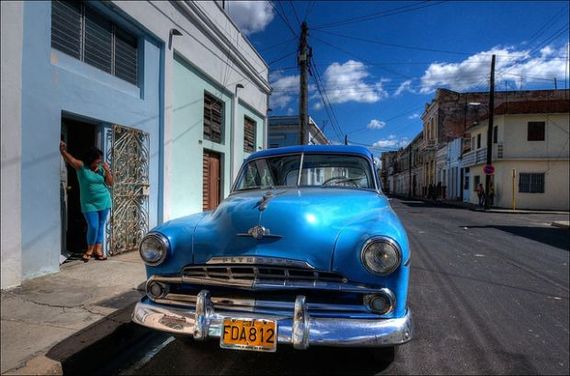Since President Barack Obama announced in December 2014 that the United States plans to restore full diplomatic relations with Cuba, avid travelers have been preparing to visit the small Caribbean nation. But it's not as easy as you might think.
Cuba already welcomes roughly three million international travelers each year; people flock to the island from Canada, Britain and Latin America to enjoy the beaches, art scene and heritage sites. But traveling to Cuba as an American is like jumping through hoops, and what you find may defy expectations. To help you better prepare for your trip, here are five things you need to know about traveling to Cuba.
1. You need a visa.
You will need to obtain a visa to travel to Cuba. You'll need to apply for the visa associated with your travel purposes, such as religious or medical travel, family visits, or people-to-people travel, which is the most common type of visa attained by Americans. When in Cuba, you will need to ensure that your activities coincide with your visa type.
The people-to-people category is most applicable to American travelers looking to experience Cuba. This type of visa requires that you engage in educational experiences with Cuban citizens, such as school visits, meetings with local artists or concerts. Tour providers like smarTours include the cost of your visa in the price of the trip -- the company will even complete the application process for you -- and ensure that you meet the requirements.
2. You need cash.
Because of the U.S. embargo, banks have not yet been able to establish a foothold in Cuba, meaning it's a cash-focused country.
You can exchange currency at the José Martí International Airport or at your hotel. Keep in mind that there is a 10 percent fee to exchange U.S. currency for Cuban currency. There are two official currencies in Cuba; when you exchange American dollars, you'll receive Cuban convertible pesos (CUC), which are roughly equal to the U.S. dollar. You may also encounter the national peso (CUP), which is worth around 4 cents. Always check your change to ensure you're receiving Cuban convertible pesos.
You'll also want to be sure to carry change for tips. In addition to hotel housekeepers, restaurant servers and cab drivers, you'll also need to leave a few Cuban convertible pesos for restroom attendants and anyone who helps you find your way. (One thing to be aware of: If you encounter elaborately dressed people on the streets of Old Havana, don't snap a photo unless you're willing to leave them with a peso or two.)
3. Hotel rooms are limited.
Restored diplomatic relations will make it easier for Americans to travel to Cuba, but the nation's infrastructure isn't quite ready to accommodate demand. If you're traveling with a tour group, this isn't something you have to worry about. But if you're visiting Cuba on your own, you'll need to make reservations well in advance.
Many Caribbean hotel brands -- including Meliá and Iberostar -- operate properties in Cuba. You can reserve a hotel room in Cuba online, though you will want to call to verify your reservation. You can also book through a travel agency. However, payment can be tricky: Even if you pay for your room through your travel agent, the embargo may prevent your payment from reaching your hotel in time (another reason to book well in advance). Come prepared with enough cash to cover the cost, just in case.
One thing to keep in mind: Cuba is a second-world country, and even brand-name hotels aren't without their quirks, such as limited television options and sporadic water temperature.
4. Prepare for a connectivity detox.
You may want to sit down for this news: Your phone won't work in Cuba. Until the embargo is lifted, U.S. phone companies won't be able to offer international calling and data packages. If you need to make calls in Cuba, you can use the landline in your hotel, or you can purchase a prepaid Cuban SIM card for roughly 3 Cuban convertible pesos per day from Cubacel (you can do this at the airport).
It is possible to connect to the Internet in your hotel -- some properties even offer this amenity for free -- but you won't receive the high-speed service you're used to. Connectivity is slow and spotty, and some American websites may not always be accessible. Rather than stress out about checking email and posting to Facebook, embrace going off the grid.
5. This isn't your typical Caribbean destination.
If you expect to find the azure waters, volcanic landscapes and manicured villages of other nearby islands like the Bahamas, the Cayman Islands or Turks and Caicos, you'll be sorely disappointed. Fifty years of strained diplomatic relations have left their mark on Cuba: Run-down buildings line the streets of Havana and modest shacks pepper the countryside.
But beauty is not hard to find here. Old Havana -- a UNESCO World Heritage Site -- is home to stunning colonial architecture and a smattering of paladars (privately owned restaurants). Limited economic opportunities have led Cubans to be creative in other ways. You can't go two blocks without encountering street murals, art studios and joyful salsa music. People like José Fuster have transformed their neighborhoods into magnificent works of art, and communities have banded together to support efforts like choirs, crafts workshops and even acrobatics. Visiting Cuba on a people-to-people trip will allow you to experience all of this and more.
About the author: Miriam B. Weiner is a Washington, D.C.-based travel editor. You can follow her on Twitter, Instagram and Google+.
Also on HuffPost:

